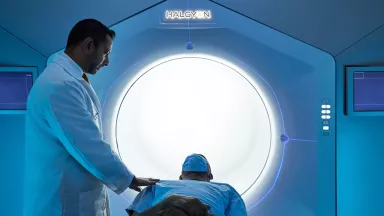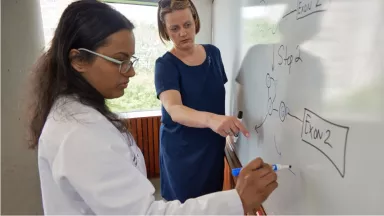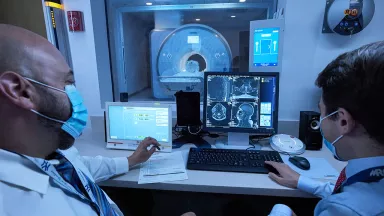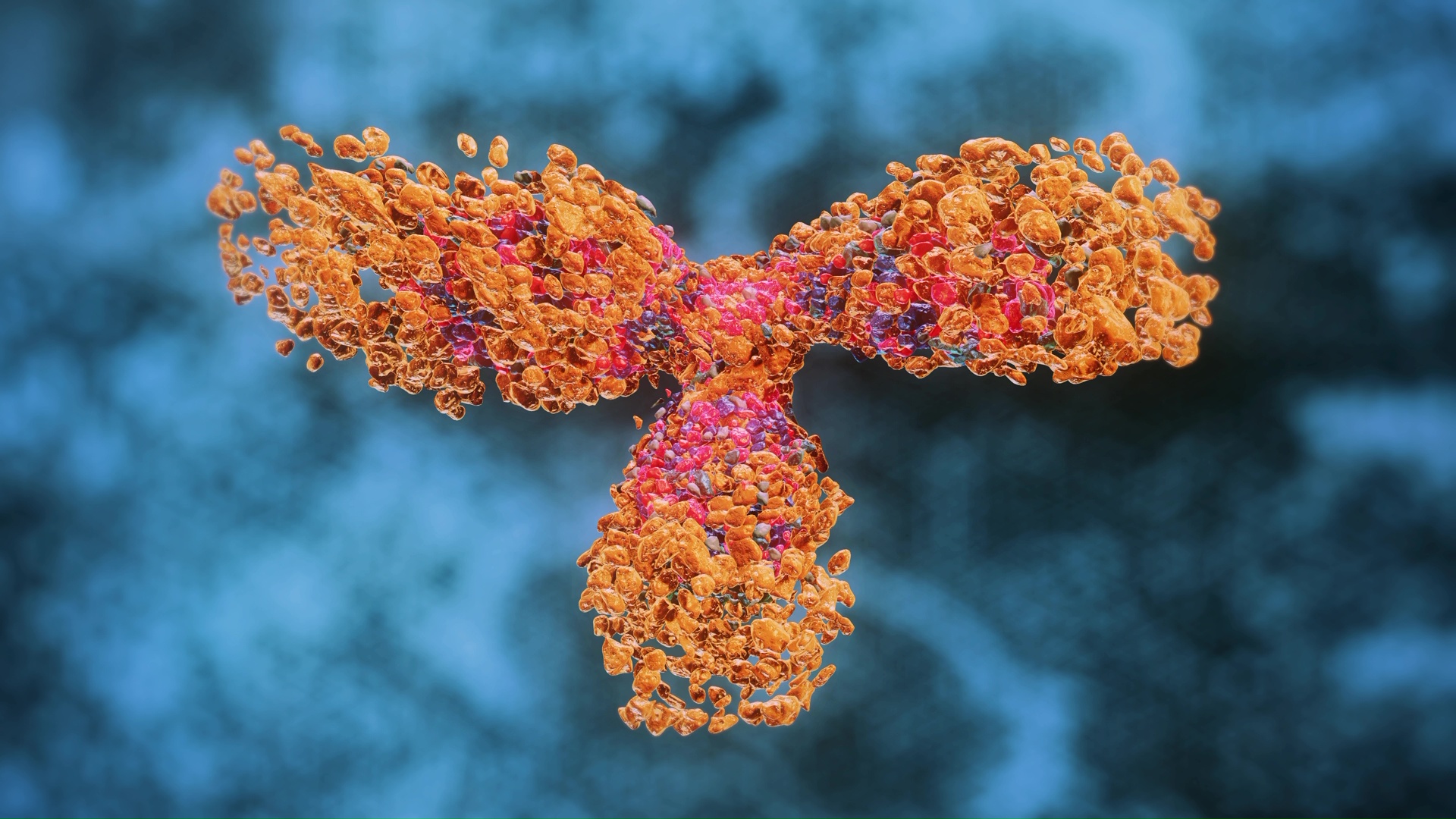Exploring & Advancing Novel Immunotherapies to Clinical Trials
Interactions between the immune system and cancers are complex and mysterious in many ways, but also rich with potential. We see immense promise in better understanding and managing these interactions—and finding ways to relieve the burden of various cancers for people in the Bronx and around the globe.
Launched in 2024 by Xingxing Zang, PhD, an international leader in developing novel immunotherapies, the Marilyn and Stanley M. Katz Institute for Immunotherapy for Cancer and Inflammatory Disorders coordinates, expands, and enhances basic science and clinical cancer immunotherapy research at Montefiore Einstein Comprehensive Cancer Center and Albert Einstein College of Medicine.
Among its goals are to increase the speed of bench-to-bedside translational immunotherapy research, develop new and more refined cancer immunotherapies, and one day expand the work to immunotherapies for illnesses beyond cancer.
This highly collaborative initiative brings together more than 45 leading scientists and clinicians from diverse fields at Montefiore Einstein Comprehensive Cancer Center and Albert Einstein College of Medicine. Its interdisciplinary approach will lead to the discovery of new immunotherapy targets and novel strategies for drug development.
Our goal is to be at the forefront of developing novel immunotherapy technologies and advancing them into clinical trials, and ultimately, effective treatments for cancer and other diseases.
Xingxing Zang, MMed, PhD
Founding Director of the Institute for Immunotherapy
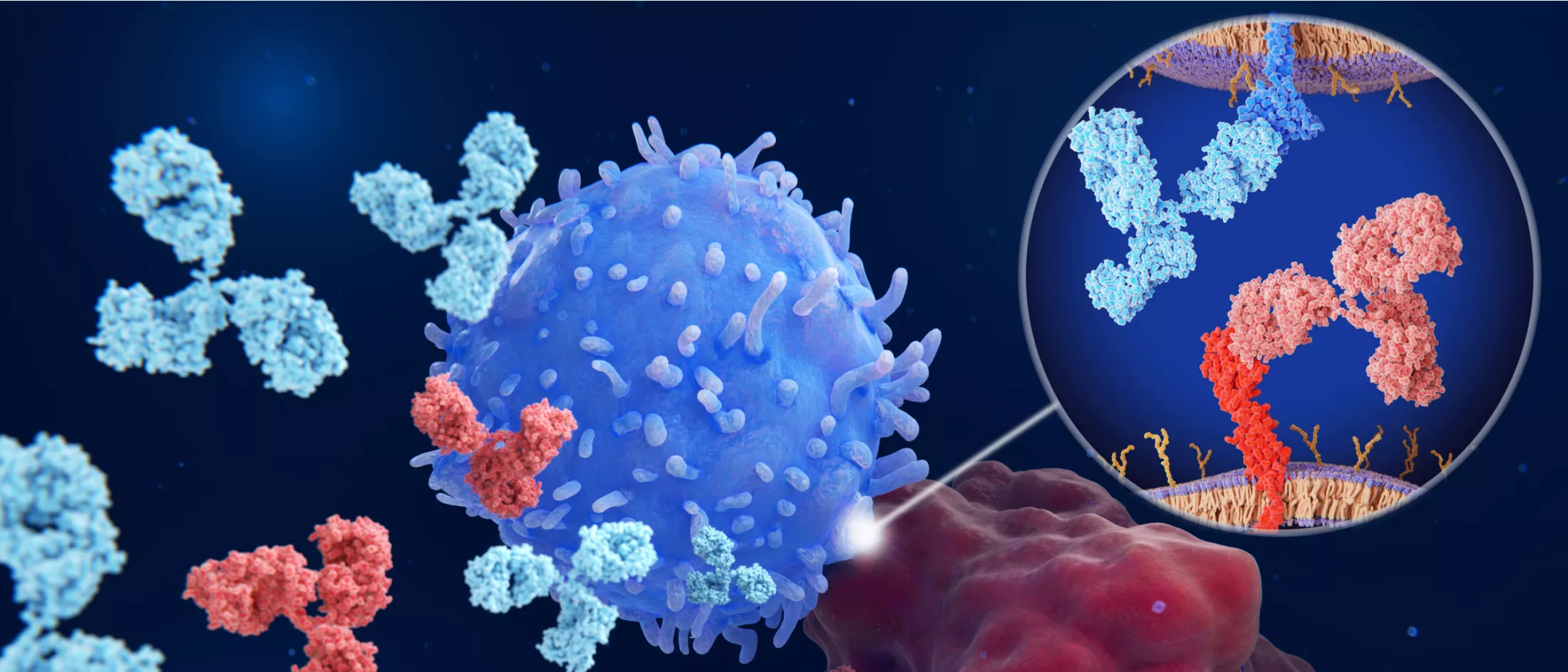
The Time is Now
Several breakthroughs over the past two decades have made the Institute for Immunotherapy’s ambitions possible. In what the global scientific community is calling a “new era of immune therapies,” investigators worldwide have been learning new ways activate and bolster the immune system’s power to eliminate disease.
There are several main types of cancer immunotherapies:
- Adoptive cell therapy, which takes an individual’s immune cells, multiplies or alters them in the lab, and infuses them back into the body.
- Cancer vaccines, which “train” the immune system to fight an existing malignancy.
- Immune checkpoint inhibitors, which release the “brakes” on the immune system. In 2018, Dr. Zang’s mentor—James Allison, PhD—received the Nobel Prize for developing the first checkpoint inhibitor. Keytruda, Yervoy, and Opdivo, are among the nine checkpoint inhibitors currently on the market
- Immune cell engagers, which redirect the patient’s immune cells toward cancer cells to trigger the killing of cancer cells by the immune cells, as well as antibody-drug conjugates, which combine chemotherapy and targeted therapy to kill cancer cells.
Groundbreaking contributions to the science and application of these cancer immunotherapies are being made by basic bench scientists, clinical investigators, and translational researchers. By working collaboratively and with cutting-edge and newly developed technologies, the Institute for Immunotherapy will accelerate the development of life-saving immunotherapies for treating cancers and other diseases.
Director, Associate Directors & Members
Institute Founder and Director, Professor Xingxing Zang, is a Professor of Microbiology & Immunology, of Oncology, of Medicine, and of Urology at Albert Einstein College of Medicine, the Louis Goldstein Swan Chair in Cancer Research at Einstein, and a member of MECCC’s Cancer Therapeutics Research Program. He is one of the world’s leading investigators in the discovery of cancer-associated immune checkpoint pathways and in the development of new immune checkpoint inhibitors.
Dr. Zang’s expertise, knowledge, creativity, productivity, and collaborative spirit have made him a true leader in the field. The team is extraordinarily pleased that he will lead this important endeavor.
Edward Chu, MD, MMS
Director, Montefiore Einstein Comprehensive Cancer Center
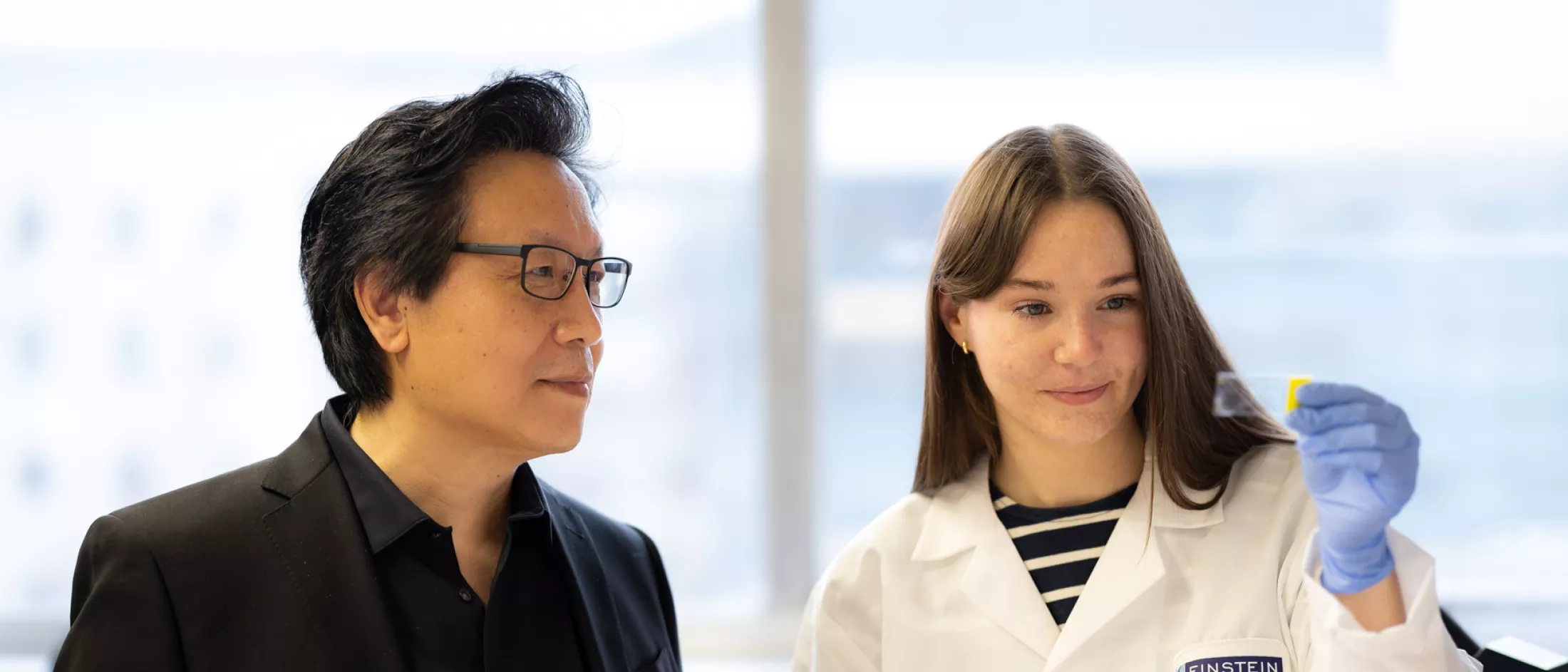
Foundational Research in Immunotherapy
Immense strides in immunotherapy research have already been made through the work of Montefiore Einstein Comprehensive Cancer Center and Albert Einstein College of Medicine scientists.
Founding director Zang’s work has been focused largely on the B7-CD28 immune checkpoint families that play important roles in cancer immune evasion and progression. Two of his compounds are now being evaluated in phase 1 and phase 2 clinical trials in multiple different types of solid cancers and types of blood cancers. He has further developed novel inhibitors against metastatic cancers that don’t respond to current drugs, and in 2024 his team showed that CAR-T, a type of adoptive cell therapy now used against blood cancers, can successfully treat solid tumors.
Some key immunotherapy research published by Dr. Zang and colleagues at the institute include:
- Nishimura CD, Corrigan D, Zheng XY, Galbo PM Jr, Wang S, Liu Y, Wei Y, Suo L, Cui W, Mercado N, Zheng D, Zhang CC, Zang X. TOP CAR with TMIGD2 as a safe and effective costimulatory domain in CAR cells treating human solid tumors. Science Advances, 10(19):eadk1857, 2024.
- Aminov S, Giricz O, Melnekoff DT, Sica RA, Polishchuk V, Papazoglu C, Yates B, Wang HW, Sahu S, Wang Y, Gordon-Mitchell S, Leshchenko VV, Schinke C, Pradhan K, Aluri S, Sohn M, Barta SK, Agarwal B, Goldfinger M, Mantzaris I, Shastri A, Matsui W, Steidl U, Brody JD, Shah NN, Parekh S, Verma A. Immunotherapy-resistant acute lymphoblastic leukemia cells exhibit reduced CD19 and CD22 expression and BTK pathway dependency. Journal of Clinical Investigation, 134(8):e175199, 2024.
- Liu Y, John P, Nishitani K, Cui J, Nishimura CD, Christin JR, Couturier N, Ren X, Wei Y, Pulanco MC, Galbo PM Jr, Zhang X, Fu W, Cui W, Bartholdy BA, Zheng D, Lauvau G, Fineberg SA, Oktay MH, Zang X, Guo W. A SOX9-B7x axis safeguards dedifferentiated tumor cells from immune surveillance to drive breast cancer progression. Developmental Cell, 58(23):2700-2717, 2023.
- Ren X, Peng M, Xing P, Wei Y, Galbo PM Jr, Corrigan D, Wang H, Su Y, Dong X, Sun Q, Li Y, Zhang X, Edelmann W, Zheng D, Zang X. Blockade of the immunosuppressive KIR2DL5/PVR pathway elicits potent human NK cell-mediated antitumor immunity. Journal of Clinical Investigation, 132(22):e163620, 2022.
- Selvanesan BC, Chandra D, Quispe-Tintaya W, Jahangir A, Patel A, Meena K, Alves Da Silva RA, Friedman M, Gabor L, Khouri O, Libutti SK, Yuan Z, Li J, Siddiqui S, Beck A, Tesfa L, Koba W, Chuy J, McAuliffe JC, Jafari R, Entenberg D, Wang Y, Condeelis J, DesMarais V, Balachandran V, Zhang X, Lin K, Gravekamp C. Listeria delivers tetanus toxoid protein to pancreatic tumors and induces cancer cell death in mice. Science Translational Medicine. 14(637):eabc1600, 2022.
- Wennerberg E, Mukherjee S, Spada S, Hung C, Agrusa CJ, Chen C, Valeta-Magara A, Rudqvist NP, Van Nest SJ, Kamel MK, Nasar A, Narula N, Mittal V, Markowitz GJ, Zhou XK, Adusumilli PS, Borczuk AC, White TE, Khan AG, Balderes PJ, Lorenz IC, Altorki N, Demaria S, McGraw TE, Stiles BM. Expression of the mono-ADP-ribosyltransferase ART1 by tumor cells mediates immune resistance in non-small cell lung cancer. Science Translational Medicine, 14(636):eabe8195, 2022
- Li M, Garforth SJ, O'Connor KE, Su H, Lee DM, Celikgil A, Chaparro RJ, Seidel RD, Jones RB, Arav-Boger R, Almo SC, Goldstein H. T cell receptor-targeted immunotherapeutics drive selective in vivo HIV- and CMV-specific T cell expansion in humanized mice. Journal of Clinical Investigation, 131(23):e141051, 2021.
- Wei Y, Ren X, Galbo PM Jr, Moerdler S, Wang H, Sica RA, Etemad-Gilbertson B, Shi L, Zhu L, Tang X, Lin Q, Peng M, Guan F, Zheng D, Chinai JM, Zang X. KIR3DL3-HHLA2 is a human immunosuppressive pathway and a therapeutic target. Science Immunology, 6(61):eabf9792, 2021.
- Ramagopal UA, Liu W, Garrett-Thomson SC, Bonanno JB, Yan Q, Srinivasan M, Wong SC, Bell A, Mankikar S, Rangan VS, Deshpande S, Korman AJ, Almo SC. Structural basis for cancer immunotherapy by the first-in-class checkpoint inhibitor ipilimumab. Proceedings of the National Academy of Sciences USA, 114(21):E4223-E4232, 2017.
- Jeon H, Vigdorovich V, Garrett-Thomson SC, Janakiram M, Ramagopal UA, Abadi YM, Lee JS, Scandiuzzi L, Ohaegbulam KC, Chinai JM, Zhao R, Yao Y, Mao Y, Sparano JA, Almo SC, Zang X. Structure and cancer immunotherapy of the B7 family member B7x. Cell Rep, 9(3):1089-98, 2014.
- Zhao R, Chinai JM, Buhl S, Scandiuzzi L, Ray A, Jeon H, Ohaegbulam KC, Ghosh K, Zhao A, Scharff MD, Zang X. HHLA2 is a member of the B7 family and inhibits human CD4 and CD8 T-cell function. Proceedings of the National Academy of Sciences USA,. 110(24):9879-84, 2013.

Our Vision
The Marilyn and Stanley M. Katz Institute for Immunotherapy for Cancer and Inflammatory Disorders anticipates making significant contributions to the field of immunotherapy, including:
Enhancing Basic Research and Translational Development in Immunotherapies
By serving as a hub for cutting-edge research and bringing together scientists and clinicians from diverse fields such as immunology, genetics, bioinformatics, pharmacology, we will uncover new targets for immunotherapy, better understanding mechanisms of immune evasion by cancer cells and developing novel therapeutic strategies.
Generating Novel Combination Therapies and Overcoming Resistance and Relapse
A significant challenge in cancer treatment is the development of resistance to therapies and relapse after treatment. By focusing on understanding the mechanisms behind resistance and relapse, we will develop strategies for generating and clinically testing combination therapies capable of preventing or overcoming these issues and thus securing long-term remission for patients.
Global Collaboration and Clinical Trials
Our institute facilitates international collaborations, creating a global network of researchers and clinical trial sites to accelerate the pace of clinical trials but also ensure that new treatments are tested across diverse populations and cancer types. Organization of this effort also helps in standardizing protocols and sharing data, making research more efficient and impactful.
Technological Innovations
Advances in technology will be critical to new immunotherapies. The institute aims to lead in the development and application of cutting-edge technologies such as CRISPR for gene editing, artificial intelligence for predicting treatment outcomes, nanotechnology for drug delivery and more. These technologies have the potential to create more effective, less toxic therapies that can be delivered more precisely to cancer cells or immune cells.

Immunotherapies for Conditions Beyond Cancer
For the Marilyn and Stanley M. Katz Institute for Immunotherapy for Cancer and Inflammatory Disorders, investigation into cancer immunotherapies is just the start. Our orientation ultimately remains a broad one, with our sights set on finding answers for the understanding and treatment of immune system-related conditions such as autoimmune diseases, inflammatory illnesses, infections, organ transplantation, neurodegenerative disorders, and the process of human aging.


